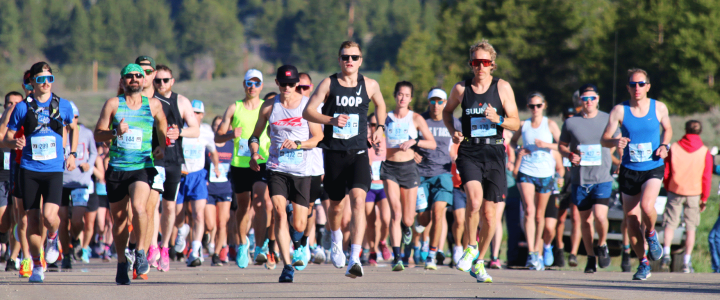
Congratulations on signing up for the Steamboat Marathon. I hope that your training is going well and that the race is proving to be a great carrot to keep you going over the colder months. While we are still snowbound here in Steamboat, rest assured the race course is going to be flanked by the greenest of green grass and cottonwoods, a fast flowing Elk river, and numerous wildflowers. If you have run our hometown marathon before, welcome back, if you have not, then you are in for a treat. The Steamboat Marathon is truly one of the most scenic road marathons out there and the hundreds of local volunteers will be cheering you back to town. Now that I have you excited for your day, let’s talk about some important training strategies.
Training
How to best train for altitude, how to be prepared for this hilly course, and my specialty, how to best tackle your nutrition! Now is the time to be working on all of this. The elevation of the full marathon ranges from 8165 ft to 6640 ft. If you live at much lower elevation, here are a few tips to help you deal with the altitude. Keep in mind that the race is often chilly at the start but you will quickly get warm. Believe it or not, if you live somewhere humid, that can often help you prepare for altitude because it is also hard on the lungs. In addition, heat training may also help with running at altitude, but consistent training with some intensity is your best weapon. As far as when you should arrive, I would suggest coming to town as close to the race as possible and extending your stay post race. Experts believe that arriving closer to race day helps because your body does not have time to start feeling the negative effects of the higher elevation. Often when racing at altitude you will encounter more hills than you may have at home. The Steamboat Marathon is a hilly road race, do not let that downhill profile convince you that somehow this will be easy, quite the contrary! The full marathon has 2,142 ft of elevation loss and 735 ft of climbing. That loss comes mostly at the beginning and going out too fast has historically caused many a blow up, even with us locals. Pace yourself and do not fall into the trap of banking time early. Many of the hills come towards the last ⅓ of the race and you want fresher legs. This is also the most exposed section of the course. I would highly suggest incorporating a good strength training program to help better handle the hills. In addition, find any incline you may have locally and run repeats, run stairways, overpasses, or the incline treadmill at the gym. Just make sure to utilize whatever you have available and run the downs hard.
Nutrition
Now what about your nutrition? You will need more water at altitude, that includes the days leading up to the race. Minimize alcohol intake in the days before, and maintain a good balance of plain water and your favorite electrolyte drink. The Steamboat marathon has an aid station about every 3 miles. This is one road marathon that I do recommend you carry your hydration vessel, such as a running vest, belt or handheld. I prefer that as I can then eat and drink on my own in between aid. The aid stations will have Honey Stinger products and water. I suggest you start to use Stinger products in training if you will utilize them on course fuel. Training your gut is imperative. The morning of the race, opt for a meal of mostly easy to digest carbohydrates. You do not want too much protein, fat, or fiber to potentially cause GI upset. Try to eat your breakfast within 2 hours of the race with extra carbs to top off your tank as you shuttle up to the start. During the race aim for 40-80g of carbohydrate an hour. An example would be a sports drink and a package of Stinger chews or two 25g gels. Some of your gels may be closer to 40g each. For water, I suggest between 400-800 ml an hour depending on your sweat rate and the conditions on race day. After the race, this is the time to get your recovery protein in and replenish your glycogen stores with ample carbs. You can also now have that beer!
I hope you have a fabulous race, I'll see you out here for my 26th year running one of the distances.
Cara Marrs is a Registered Dietitian Nutritionist, a certified ultra running coach, and teaches Human Nutrition courses at Colorado Mountain College. She is an avid runner, ultra runner, and skier herself as well as a long time local. In addition, she directs the non-profit Steamboat Springs Running Series. She can be reached at www.caramarrswellness.com







